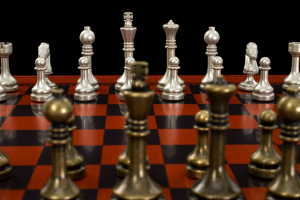 I don’t want to stray too far away from the topic of our Christian nation. I want to talk, though, about the concept of tribalism. It refers to the way that we define “us” and “them.” Every society has a set of rules that applies to our dealings with “us” and our dealings with “them.” We react differently to what happens to “us” than we do when it happens to “them.” (I discussed this in the post “Glad No Parrots Were Involved“; some read this as “America bashing,” when it was intended as “tribalism bashing”—that’s why the first illustration in that post was from Great Britain).
I don’t want to stray too far away from the topic of our Christian nation. I want to talk, though, about the concept of tribalism. It refers to the way that we define “us” and “them.” Every society has a set of rules that applies to our dealings with “us” and our dealings with “them.” We react differently to what happens to “us” than we do when it happens to “them.” (I discussed this in the post “Glad No Parrots Were Involved“; some read this as “America bashing,” when it was intended as “tribalism bashing”—that’s why the first illustration in that post was from Great Britain).
Tribalism says we can steal from them, but not from us. We can kill them, but not kill us. We can cheat them, but we’re expected to deal justly with us. If one of us is killed, we will avenge it by killing them. We see an innocuous form of tribalism in our sports; penalties against our team almost always seem to be unfair, while penalties against the other team are justified. If our team scores a lot of points, they are going for style points. If the other team scores a lot, they are showing a lack of sportsmanship.
Tribalism can occur at different levels. It can be based on family. Gangs operate via tribalism. Tribalism can be present based on religion, geography, or politics. In the West, people are often tribalistic at a national level, while much of the rest of the world divides itself along different lines.
We have to understand that the Christian nation doesn’t respect manmade borders and territories. As Paul so ably said it, “Here there is no Greek or Jew, circumcised or uncircumcised, barbarian, Scythian, slave or free, but Christ is all, and is in all.” (Colossians 3:11) The church isn’t made up of Haitians, Egyptians, Filipinos and Canadians. We are Christians. We are one nation.
Here’s what we have to understand. A believer in China is more “us” than a non-believer next door. A Christian Iraqi is more “our people” than a non-Christian U.S. soldier in the same place. When we talk about “our people overseas,” we aren’t talking about U.S. troops, we’re talking about our Christian brothers.
Does that mean we will operate by the rules of tribalism, cheating non-Christians because they aren’t “one of us.” Of course not. But we will put as much importance on the well-being of Haitians as we do on that of people in our own hometown. More than citizens of the world, we are citizens of heaven, which makes us ambassadors of good to the whole world.



